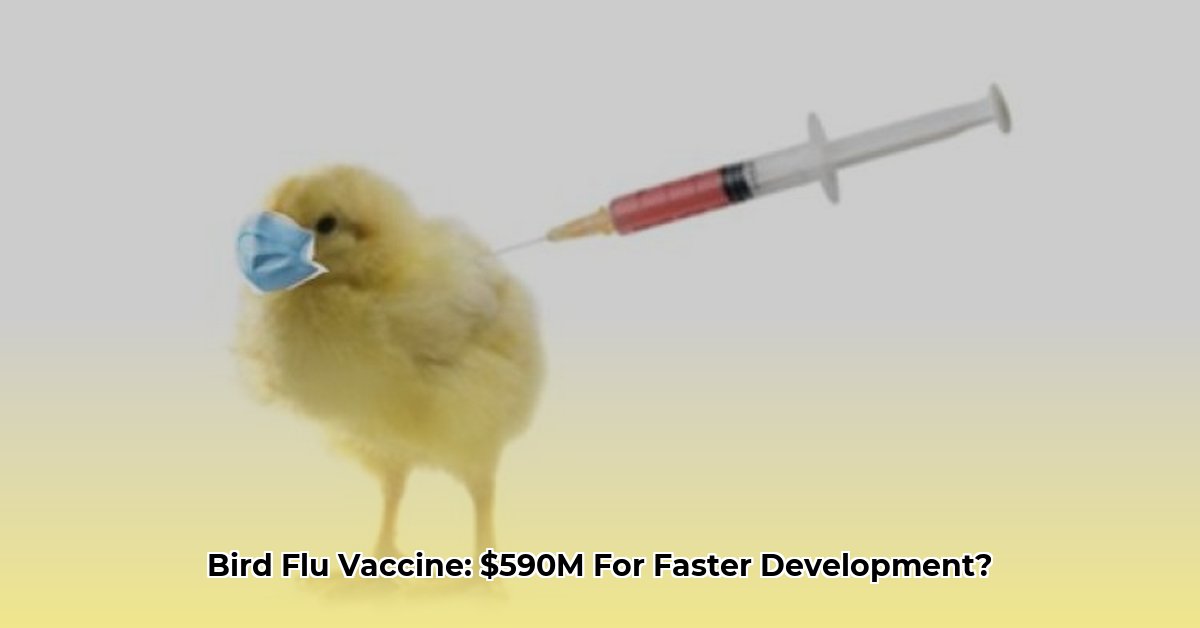Bird Flu Vaccine Research Gets a Boost
The U.S. Department of Health and Human Services (HHS) has awarded Moderna $590 million to accelerate the development of an mRNA vaccine for bird flu. This substantial investment underscores the government’s commitment to pandemic preparedness, even though the current risk to humans from bird flu is relatively low. The funding will support late-stage development, licensure, and larger clinical trials, building upon a previous $176 million grant awarded to Moderna in July 2023 for research on H5 and H7 bird flu viruses.
Bird Flu: Understanding the Threat
Avian influenza, commonly known as bird flu, is a virus that primarily affects birds. While human infections are rare, they can occur, highlighting the importance of proactive measures. The current strain of concern is H5N1, which has been spreading among bird and some mammal populations. As of January 17, 2025, the U.S. has reported 67 human cases of bird flu, including one death.
| Statistic | Number |
|---|---|
| U.S. Bird Flu Cases | 67 |
| U.S. Bird Flu Deaths | 1 |
While these numbers are currently low, the virus’s potential to mutate and become more easily transmissible between humans necessitates ongoing vigilance and preparedness.
Moderna’s mRNA Vaccine: A New Approach
Moderna’s vaccine leverages mRNA technology, the same technology used in the COVID-19 vaccines. mRNA vaccines work by delivering instructions to our cells, teaching them to produce a specific viral protein. This triggers an immune response, preparing the body to fight off the actual virus if encountered. This approach offers advantages in terms of speed and adaptability, crucial factors in responding to evolving viruses.
The current funding will enable Moderna to expand their research to include up to five other pandemic influenza subtypes, beyond the initial focus on H5N1. This broader approach aims to develop a more versatile vaccine that can offer protection against multiple strains, even as the virus mutates.
The Role of mRNA Technology in Vaccine Development
mRNA technology has the potential to revolutionize vaccine development. Unlike traditional methods, which can be time-consuming and complex, mRNA vaccines can be developed and adapted much more rapidly. This agility is critical in responding to quickly evolving viruses like influenza.
Several research groups, including Moderna, the University of Pennsylvania, and the CDC, are exploring the potential of mRNA vaccines for bird flu. The WHO is also involved, working to ensure global access if these vaccines prove effective. Early results from studies are promising, suggesting that mRNA technology could be a game-changer in the fight against bird flu and other infectious diseases.
Current Risks and Concerns
While the current risk of widespread human transmission of bird flu is low, several concerns warrant attention:
- Viral Evolution: The H5N1 virus mutates rapidly, making it a moving target for vaccine development. Scientists must constantly adapt their strategies to keep pace with these changes.
- Immunity Duration: The duration of immunity provided by a bird flu vaccine remains a question. Researchers are working to ensure long-lasting protection, but this is a significant challenge.
- Vaccine Safety: Rigorous safety monitoring is crucial throughout the vaccine development and distribution process. Transparency about potential side effects is essential for building public trust.
- Production and Distribution: Manufacturing and distributing a vaccine globally presents significant logistical challenges. Equitable access for all populations is a key consideration.
- Public Trust: Combating vaccine hesitancy through clear and accurate communication is vital for the success of any vaccination campaign.
- Financial Considerations: The cost of vaccine development and deployment is substantial. Balancing affordability with the urgent need for pandemic preparedness requires careful planning.
Precautions and Recommendations
While researchers work on developing effective vaccines, individuals can take steps to protect themselves:
- Avoid close contact with sick or dead birds.
- Practice good hand hygiene, washing hands frequently and thoroughly.
- Stay informed about updates from the CDC (https://www.cdc.gov/) and local health authorities.
The Future of Pandemic Preparedness
The investment in bird flu vaccine research signifies a shift toward proactive pandemic preparedness. While challenges remain, the development of mRNA vaccines and other advancements offer hope for a future where we are better equipped to respond to emerging infectious diseases. Continued research, open communication, and global collaboration are essential to navigate the complexities of this ongoing effort. It’s also important to acknowledge that scientific understanding is constantly evolving, and our knowledge of bird flu and its potential impact may change as research progresses.







